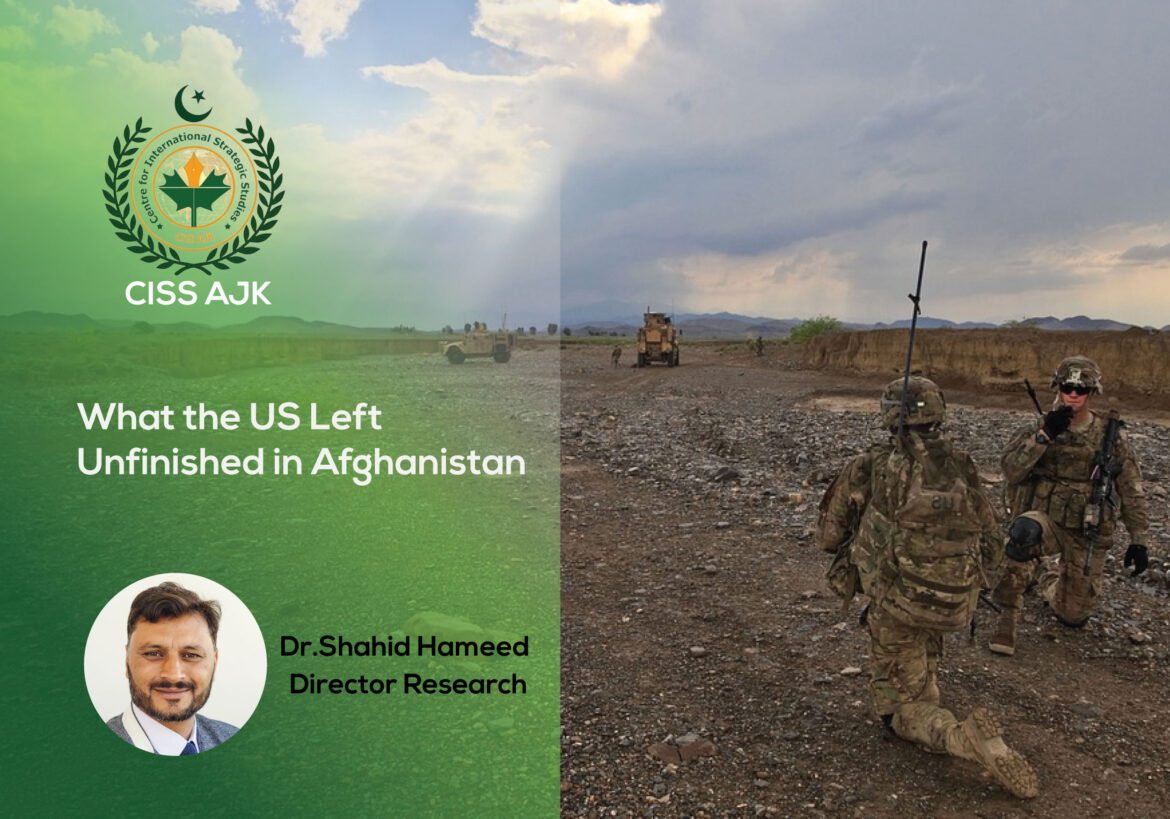This was not the first time the United States abandoned its allies, particularly in South Asia. In the post-Cold War era, the same has happened; scattered armed groups in Afghanistan became an ultimate threat to global security, resulting in another 20 years of military engagement in Afghanistan. American power is shrinking worldwide, and the reason is abandoning friends and allies in crisis situations, while offering conditional support when needed.
Pakistan has faced the consequences of what the United States and NATO forces left unfinished in Afghanistan. It suffered unmatched economic, social, and human costs as a front-line state during US war on terror in Afghanistan. Unfortunately, the hasty US exit from Afghanistan without proper political and security arrangements has returned the world to the 9/11 scenario. Despite spending trillions of dollars, the Pentagon failed to achieve its objectives and withdrew forces without considering the long-term consequences for global peace and stability. Meanwhile, recent developments in Afghanistan and beyond prove that American expectations of the Taliban were based on false assumptions. The nexus of the Baloch Liberation Army (BLA), Islamic State (IS), and Tehrik-i-Taliban Pakistan (TTP) have been sheltered by the Taliban’s influence. At the same time, the economic conditions in the region are facing a rapid downward spiral.
In the last few months, several Pakistani soldiers have lost their lives in cross-border attacks by TTP militants. Afghan soil has been used by these armed groups, and the new connections between the BLA, IS, and TTP make the situation worse for Pakistan. Pakistan has been supporting peace and stability in Afghanistan and intends to continue the same policy. A strong government in Afghanistan is always in the interest of Pakistan and the region. However, the central government in Afghanistan did not pay attention to controlling armed groups operating from Afghan soil. Pakistan realizes that the humanitarian crisis in Afghanistan may have implications for Pakistan due to its geographic and ethnic linkages and thus desires to work with Kabul for the common good. The recent visit of the Minister of State for Foreign Affairs, Hina Rabbani Khar was also a step towards the same objective. However, Pakistan’s diplomatic mission was attacked by Afghan militants shortly after that visit, and several civilians were killed by Afghan armed groups near Pakistan’s Chaman border.
The US and the international community have the responsibility to accomplish what they need to in Afghanistan. First, the economic turmoil in Afghanistan is directly connected with the economic instability in Afghanistan. The US and other major powers ought to back Pakistan’s efforts to promote peace through the economic normalization of Afghanistan. Negotiating with the Taliban government in Kabul and assisting them to meet economic challenges may improve intra-Afghan armed polarization. Second, the US must continue a preferential policy towards Pakistan even after concluding its war in Afghanistan. Close diplomatic and political engagement with Pakistan must be needed to ensure peace and stability in the region. The US non-preferential foreign policy behavior during the post-Cold War era has historically threatened regional stability, and doing so again could have the same effects. By and by, the continuation of close bilateral collaboration between Pakistan and the US will be beneficial not only for both states but also for regional and global peace. Third, the international community must play its role in convincing the Taliban government not to support armed splinter groups, including TTP, IS, and BLA, that are causing harm to Afghanistan’s role as a normal state in the international arena. Finally, the collaboration of international organizations and financial institutions is a dire need for the future and prosperity of Afghanistan. To initiate these developments, the US must relax sanctions on Afghanistan’s financial flow. By doing this, confidence between Kabul and the international community will grow, making it easier to resolve the problems. The unfinished US agenda in Afghanistan is a real threat to intra-Afghan stability and a potential threat to regional peace in South Asia. Although, the US is aware of the emerging situation and has expressed its concerns; however, no practical steps have been taken by Washington. The humanitarian catastrophe in Afghanistan and the restructuring of splintered armed groups are both getting worse with each passing day. Unfortunately, the Kabul government lacks a proper government structure to meet these challenges, nor does it have a black-and-white intention to cooperate with the international community. The unfinished agenda to reconstruct peace, harmony and prosperity is still awaiting completion, and the only solution is unconditional American resolve toward its allies.



